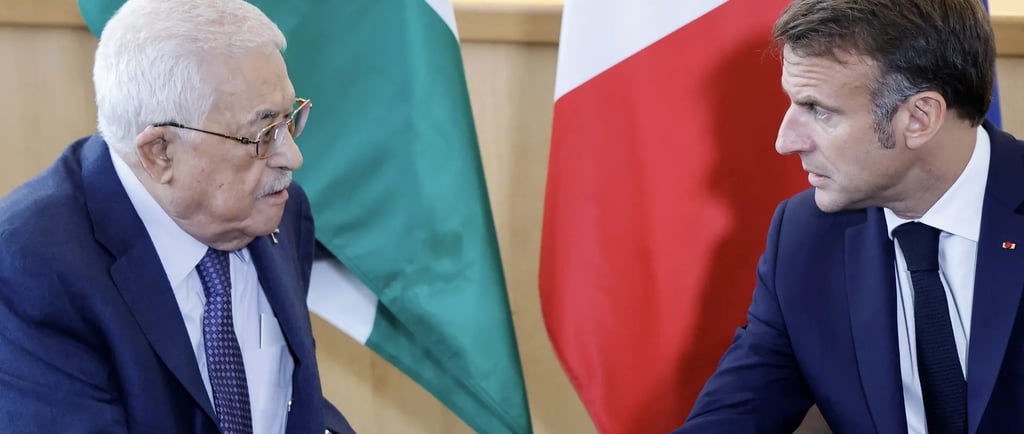The Geopolitical Impact of France Recognizing Palestine
Why France's Move to Recognize Palestine Could Reshape Geopolitics French President Emmanuel Macron has announced a significant diplomatic shift: France plans to formally recognize the Palestinian state in September during the highly anticipated United Nations General Assembly session. This decision isn't just another headline; given France's pivotal influence within the European Union, it signals a potentially seismic shift in international relations and could redefine the future of the Israeli-Palestinian conflict
WORLD UPDATA
Qasim ali
5/8/20243 دقيقة قراءة


Why France's Move to Recognize Palestine Could Reshape Geopolitics
French President Emmanuel Macron has announced a significant diplomatic shift: France plans to formally recognize the Palestinian state in September during the highly anticipated United Nations General Assembly session. This decision isn't just another headline; given France's pivotal influence within the European Union, it signals a potentially seismic shift in international relations and could redefine the future of the Israeli-Palestinian conflict.
A Symbolic Yet Potent Gesture
Recognizing Palestine involves practical steps like upgrading the Palestinian consulate to an embassy in France, but its true power lies in its symbolism. This move serves as a profound diplomatic pressure point on both Israel and the United States, intensifying international acknowledgment of Palestine's right to sovereignty. Unsurprisingly, both Israel and the U.S. have vehemently criticized such recognitions, often equating them with supporting terrorism, particularly in the wake of recent regional tensions.
A Global Tide Turning?
Currently, 147 countries worldwide already recognize Palestinian statehood. Should France follow through, it would become the 148th. This growing wave of international support, especially from influential European nations like Norway, Spain, Sweden, and Ireland, reflects a discernible global shift. A significant factor driving this change appears to be widespread international opposition to Israel's actions in Gaza, with a large percentage of the global population aligning against current policies. European nations, in particular, seem eager to align with this sentiment for a mix of diplomatic, empathetic, and economic reasons.
Historical Context and Future Implications
The journey towards Palestinian recognition is a long one, symbolically initiated by Yasser Arafat's declaration of independence in 1988. Beyond solidarity, Western countries, including European nations, have an additional strategic motive for recognizing Palestine: addressing the escalating destabilization of the Arab world and North Africa. This instability has directly contributed to significant migrant flows into Europe. By supporting Palestinian statehood, these nations hope to foster greater regional stability, which could, in turn, alleviate migration pressures. Furthermore, European Union countries have historically been major humanitarian aid providers to Palestinian territories, underscoring a deep-seated concern for the Palestinian people.
The Road Ahead: Will France Deliver?
The critical question remains: Will France genuinely follow through with its promise in September? Past instances have shown how American and Israeli pressure can derail such initiatives. However, the increasing global support for Palestine, now potentially including a permanent member of the UN Security Council like France, presents a formidable challenge. This growing international consensus will undoubtedly make it far more difficult for Israel and the U.S. to maintain their current policies in the long term.
Quick Refreshers to Share:
Breaking News (Still Fresh!): French President Emmanuel Macron formally announced on July 24/25 that France will recognize the Palestinian state at the UN General Assembly in September 2025. This is not just a proposal; it's a stated intention.
A Major European Power Takes a Stand: France will be the first G7 nation and the biggest Western power to formally recognize Palestine. This is a significant diplomatic move that breaks from the stance of many other major Western countries (like the U.S., UK, and Germany, who still largely prefer recognition only after a negotiated peace deal).
Pressure on the West: This decision puts immense pressure on other leading democracies, particularly in Europe and the G7, to consider following suit. It signals a growing frustration among Western allies with the ongoing conflict and humanitarian crisis in Gaza.
Why Now? Macron's announcement comes amid soaring global anger over the humanitarian catastrophe in Gaza, including widespread starvation. France has joined over two dozen countries in condemning Israel's restrictions on aid. This recognition is seen as a diplomatic effort to promote a two-state solution and potentially stabilize the wider region.
Reactions are Divided:
Palestinians (PA, PLO, Hamas): Welcomed the decision as a positive step reflecting commitment to international law and self-determination.
Israel: Strongly condemned the move, with PM Netanyahu calling it a "grave mistake" that "rewards terror" and risks creating a "launch pad to annihilate Israel."
United States: "Strongly rejects" the decision, labeling it "reckless" and serving "Hamas propaganda."
Symbolic Power, Real Impact: While largely symbolic for now, France's recognition adds significant weight to the international push for Palestinian statehood. It makes it harder for Israel and the U.S. to maintain their current policies without increasing global isolation.
More Than Just Diplomacy: Some analysts suggest Macron's move also aims to address regional destabilization contributing to migration flows into Europe, and to push for reforms within Palestinian governance.